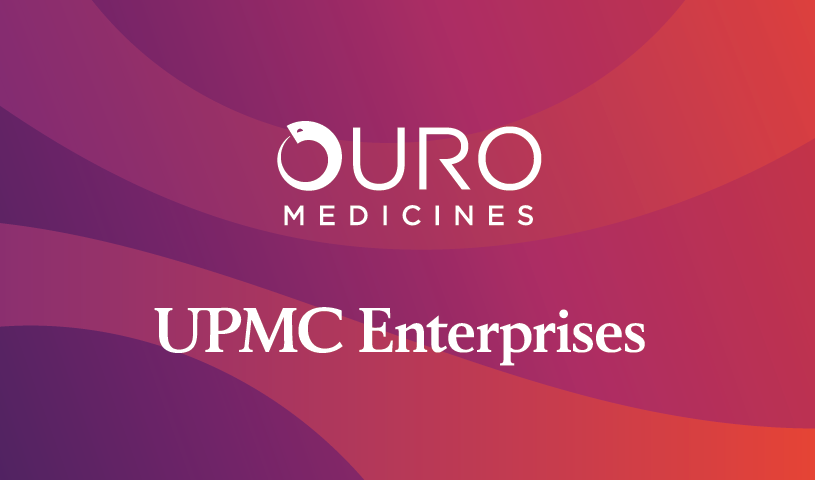
Aug 6, 2025
UPMC Enterprises Invests in Ouro Medicines to Advance New Autoimmune Therapies Through T-Cell Engagers and B-Cell Depletion
Autoimmune diseases remain among the most complex and challenging conditions, due to their biological heterogeneity and the difficulty of achieving safe, durable remission. Many patients face lifelong illness with limited treatment options, often relying on chronic immunosuppression to manage symptoms.
New therapeutic strategies are emerging that more precisely target the immune mechanisms driving these diseases, with the potential to deliver longer-lasting responses and in some cases medication-free remission. One such approach is B-cell depletion, which aims to restore healthy immune function and potentially eliminate the need for chronic medication. While not fully validated, this “immune reset” is promising. Early data suggest that the immune system can repopulate after treatment, allowing patients to regain normal immune responses over time.
To support this innovation, UPMC Enterprises has invested in Ouro Medicines, a company developing a new class of bispecific T-cell engager (TCE) therapies for severe and refractory autoimmune conditions. This investment reflects both the promise of Ouro’s platform and its alignment with UPMC’s clinical and research strengths in autoimmune disease. It also underscores the mission of UPMC Enterprises to accelerate the translation of novel therapies from bench to bedside.
Targeting B Cells Through T-Cell Engager Technology
B-cell dysregulation plays a central role in many autoimmune diseases, contributing to the production of autoantibodies and other pathogenic processes that sustain disease activity. While existing B-cell depletion therapies have shown clinical utility, they are often limited in efficacy and may not provide lasting disease control.
Ouro Medicines is developing bispecific T-cell engagers (TCEs) that are designed to eliminate disease-driving B cell populations with greater potency to affect a full immune reset. These molecules work by redirecting the activity of cytotoxic T cells toward B cells in order to realize more complete depletion than the current class of antibody-based therapies are able to provide. This in turn offers the potential for a longer drug-free remission. As off-the-shelf biologics, TCEs also avoid many of the challenges inherent in individualized cell therapies, such as chimeric antigen receptor (CAR) T-cell therapy.
Ouro’s lead asset, OM336, was particularly attractive to the team at UPMC Enterprises because it targets B cell maturation antigen (BCMA) on B cells — offering a broader depletion of pathogenic B-cell populations compared with other approaches. This asset, licensed from KeyMed Biosciences, has already advanced into clinical testing for multiple myeloma and has provided early data on its safety, activity, and B-cell depletion efficacy. Ouro is now applying this technology to autoimmune conditions where B-cell depletion may lead to improved outcomes, such as immune thrombocytopenia (ITP) and autoimmune hemolytic anemia.
Early data from Ouro’s asset has shown that treatment with OM336 leads to B-cell depletion and a reset on disease scores. While the full durability of these effects are not yet known, the greater-than-six months durability seen so far with these approaches hint at the potential for long-term medication-free remission.
“We are excited by the potential of Ouro’s technology to produce an immune reset that could allow patients to live a disease-free life without chronic medication and potentially even lead to a cure for conditions for which there are few treatment options,” said Ketki Karanam, vice president of ventures at UPMC Enterprises. “Early data indicates that the immune system is able to repopulate B cells following treatment, suggesting healthy immunity could be restored in treated individuals allowing them to recover normal immune responses in the long-term.”
A Natural Fit with UPMC Enterprises’ Life Sciences Strategy
Ouro joins UPMC Enterprises’ growing portfolio of life sciences start-ups and investments, a strategy which is focused on developing novel therapeutics for complex diseases with high unmet needs and clinical burden. The current portfolio includes a diverse mix of companies working to advance immune-modulating platforms, including approaches targeting regulatory T cells and T-cell signaling pathways. Ouro’s bispecific TCE platform expands the portfolio by directly involving the role of B cells, which are involved in many autoimmune disease processes.
UPMC Enterprises investment in Ouro and its technologies aligns with the broader strategy to support innovation across the full spectrum of immune dysregulation driving autoimmune disease pathogenesis.
UPMC’s Expertise in Autoimmune and Rheumatic Diseases
UPMC’s leadership in autoimmune disease care provides a strong clinical and translational foundation for the UPMC Enterprises investment in Ouro. Across multiple specialties, UPMC has deep expertise in the diagnosis, management, and investigation of complex autoimmune conditions. This includes nationally recognized leadership in research and clinical care from the Division of Rheumatology and Clinical Immunology with centers of excellence in multiple areas including scleroderma, systemic lupus erythematosus, rheumatoid arthritis, and myositis. UPMC’s multidisciplinary teams care for a broad spectrum of myositis subtypes, including patients with highly refractory or rare disease presentations.
UPMC Enterprises role as a value-added investor in Ouro reflects confidence in the scientific and clinical rationale for TCE therapies and creates opportunities for scientific collaboration as Ouro advances its clinical programs. By contributing clinical expertise, patient populations and data, and the existing research infrastructure around autoimmune disorders, UPMC is positioned to help facilitate the translation of emerging therapies like the OM336 candidate into clinical practice.
The Path Toward Clinical Trials
Ouro is moving its OM336 therapeutic into clinical studies targeting multiple autoimmune indications. Early development will focus on diseases with limited treatment options where enhanced, B-cell depletion may provide significant therapeutic benefit for patients who have exhausted existing therapies.
The company recently announced that it had initiated a multi-national clinical study of OM336 in autoimmune hemolytic anemia (AIHA) and/or immune thrombocytopenia (ITP). In addition, the company said U.S. Food and Drug Administration granted Orphan Drug Designation to OM336 for development in the treatment of AIHA.
In particular, Ouro’s approach stands to benefit those autoimmune conditions where the pathology is heavily autoantibody driven, and where depletion of the plasma cells would be critical to facilitate long-lasting remission. If successful, Ouro’s approach may provide an opportunity to change the course of severe, chronic autoimmune diseases by promoting long-term disease management rather than indefinite or cyclical control of symptoms.
UPMC Enterprises’ investment in Ouro is based on the scientific potential in this emerging class of therapeutics and a broader system-wide commitment to supporting the development of innovative treatments to address gaps in care for patients living with complex chronic autoimmune conditions.
Next Steps
- Learn more about Ouro Medicines and their place among the 2025 Fierce 15 from Fierce Biotech.
- Find out how the Translational Sciences team at UPMC Enterprises add value to portfolio companies.
- Reach out to our investment teams.
Note: UPMC has a financial interest in Ouro Medicines.


